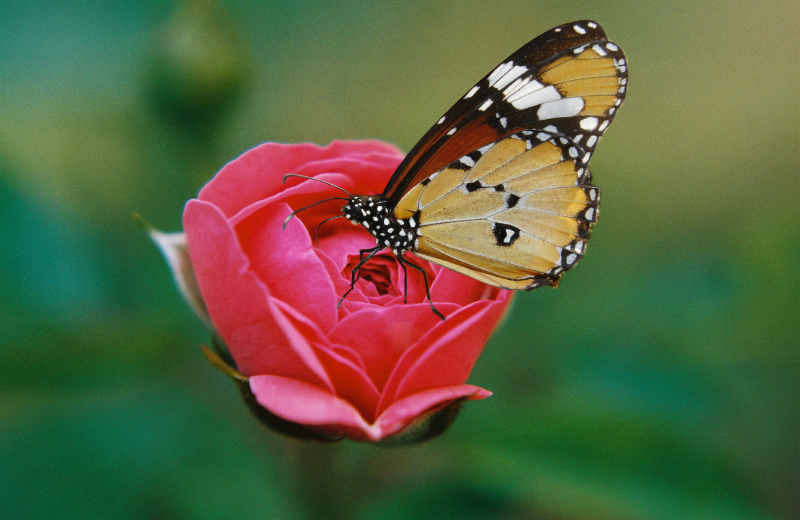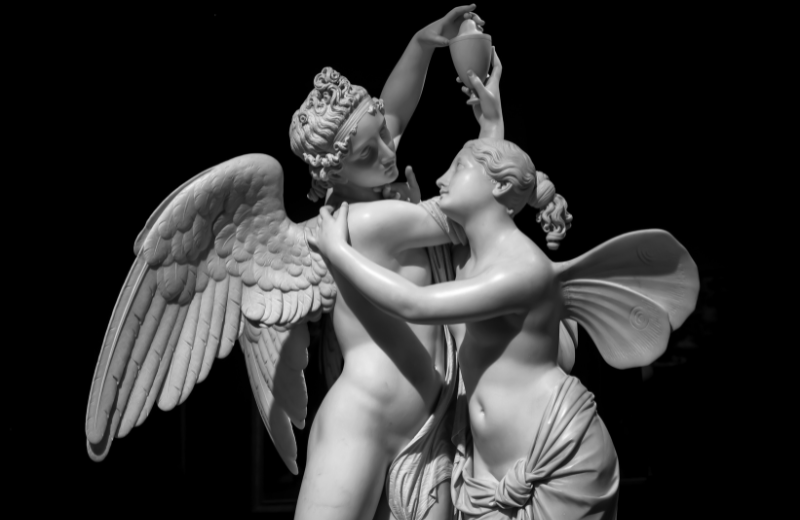Greek mythology is filled with tales of gods, heroes, and mortals who undergo incredible trials. One of the most captivating stories is that of Psyche, a mortal woman whose beauty rivalled that of the goddess Aphrodite. Her tale is a story of love, betrayal, hardship, and ultimately, transformation. If you’ve ever wondered who Psyche is in Greek mythology, or what happened to Psyche in the end, this guide will answer your questions.
Jump to:
Recommended for you!
Best SellersPsyche's Myths
The story of Psyche is one of the most famous in Greek mythology, primarily because of her relationship with Eros (Cupid), the god of love. It is a tale of romance, betrayal, and redemption that takes Psyche from a mortal princess to a goddess of the soul.
Psyche’s Beauty and Aphrodite’s Jealousy
Psyche was a mortal woman so stunningly beautiful that people began to worship her instead of Aphrodite, the goddess of love and beauty. Temples meant for Aphrodite were left empty as mortals admired Psyche instead. Furious at being overshadowed, Aphrodite devised a cruel punishment.
She commanded her son Cupid (Eros) to make Psyche fall in love with the most hideous and wretched man on earth. However, when Cupid saw Psyche, he was so struck by her beauty that he could not bring himself to follow his mother’s orders. Instead, he fell deeply in love with her.
The Forbidden Love of Psyche and Cupid
Cupid took Psyche to a magnificent palace where she was treated like a queen, with everything she could ever desire. However, there was one condition—she was never allowed to see his face. Every night, he would visit her under the cover of darkness, and though their love grew strong, Psyche longed to know who he really was.
Her jealous sisters, envious of her luxurious life, convinced her that her mysterious husband might be a fearsome monster. Overcome by curiosity and doubt, Psyche lit a lamp while Cupid slept, revealing his divine beauty. A drop of hot oil from the lamp fell onto his skin, waking him. Heartbroken by her betrayal of trust, Cupid fled, leaving Psyche alone and filled with regret.
Psyche’s Trials and Transformation
Determined to win Cupid back, Psyche sought help from Aphrodite, who set her three impossible tasks:
- Sorting a mountain of tiny seeds – Ants took pity on Psyche and helped her complete the task.
- Fetching golden wool from deadly sheep – A river god advised her to collect the wool caught on the bushes instead.
- Gathering beauty from Persephone – Psyche descended into the Underworld to retrieve a box of beauty from Hades' queen. However, curiosity struck again, and she opened the box, causing her to fall into a deep, death-like sleep.
Cupid, still in love with Psyche, found her lifeless body and revived her with a kiss. Moved by their love, Zeus intervened and granted Psyche immortality, allowing her to marry Cupid and live as a goddess of the soul forever.
The Role of Psyche in Greek Storytelling

Psyche’s tale is unique because it combines the struggles of a mortal with the trials of a hero. While many Greek goddesses were born divine, Psyche's transformation from a mortal to a goddess of the soul symbolises the human journey of growth, struggle, and self-discovery.
Her story also introduces the theme of trust and redemption in love. Psyche and Eros’ relationship shows that love is not just about beauty and attraction, but also about patience, understanding, and forgiveness.
What Powers Did Psyche Possess?
As a mortal, Psyche had no supernatural powers, but she possessed qualities that made her stand out. Her determination, courage, and intelligence allowed her to complete Aphrodite’s near-impossible tasks. After becoming the goddess of the soul, Psyche gained divine powers, but myths do not detail specific abilities like those of Zeus or Athena. However, given her role, she is associated with:
- Understanding human emotions – As the goddess of the soul, she represents deep emotions and self-awareness.
- The power of transformation – Psyche’s journey from mortal to goddess reflects personal growth and spiritual enlightenment.
- Connection to love – Her bond with Cupid suggests she has influence over deep, true love.
Symbols Associated with Psyche

Psyche’s name means "soul" in Greek and is often linked with symbols of transformation, love, and the human spirit. Some key symbols include:
- Butterfly wings – Psyche is often depicted with butterfly wings, symbolising the soul's journey and transformation.
- The rose – A flower linked to love and beauty, often associated with her relationship with Cupid.
- A golden box – Represents temptation and curiosity, as seen when Psyche opens Persephone’s box.
- A lamp – Symbolises truth and revelation, as Psyche used one to see Cupid’s face.
Psyche's Lineage and Connections
Though Psyche was originally a mortal princess, her extraordinary beauty and fate intertwined her with the gods. Despite being born to a human king and queen, her story set her apart from other mortals, ultimately leading to her ascension into godhood.
Her marriage to Cupid (Eros), the god of love, established her as a member of the divine realm. Through this union, she became the daughter-in-law of Aphrodite, though their relationship remained tense due to the goddess’ initial resentment and jealousy. Even after Psyche's trials and transformation, Aphrodite’s pride and rivalry likely meant their bond was never entirely free from tension.
When Psyche was granted immortality by Zeus, she was officially welcomed among the Olympian gods, symbolising her complete transformation from a mortal woman to a divine being. In time, she and Cupid had a daughter named Voluptas (Hedone), the goddess of pleasure, delight, and bliss.
Their daughter embodied the result of soul (Psyche) and love (Eros) coming together, representing the deep connection between human emotions and happiness. Through her divine family, Psyche became linked to both love and the human soul, making her one of the few mortals to truly bridge the gap between humanity and the gods.
Why is Psyche Special?
Psyche is one of the few Greek figures who started as a mortal and became a goddess. Unlike Athena or Artemis, who were born divine, Psyche’s divinity was earned through trials and perseverance.
Her story also resonates with many because it mirrors human emotions and struggles—from love and betrayal to perseverance and ultimate success.
Psyche in Modern Culture

The myth of Psyche has left a lasting impact on literature, art, and psychology. Her journey from mortal woman to goddess of the soul continues to resonate with audiences today, symbolising love, self-discovery, and transformation.
Psyche in Language and Psychology
The very word "psyche" is still widely used today to refer to the mind, soul, and inner self. In psychology, it represents the human consciousness and emotions, reflecting Psyche’s role as the goddess of the soul. Sigmund Freud and Carl Jung explored the psyche’s complexities, drawing connections between mythology and the human experience.
Psyche in Literature and Film
Psyche’s story has inspired countless books, plays, and films, particularly those that explore themes of love, trials, and transformation. Her tale closely parallels fairy tales like Beauty and the Beast, where a heroine must prove her love through challenges and self-growth. The theme of forbidden love also appears in classic literature, including Romeo and Juliet, where love defies obstacles but comes at a great cost.
Psyche in Art and Symbolism
In visual art, Psyche is often depicted as a young woman with butterfly wings, symbolising her soul’s transformation. Sculptures, paintings, and tapestries throughout history have captured key moments from her myth, such as Cupid awakening Psyche with a kiss or her descent into the Underworld. Artists from the Renaissance to the 19th century, including Antonio Canova and William-Adolphe Bouguereau, created iconic works inspired by her legend.
Psyche’s Influence on Modern Storytelling
The timeless themes in Psyche’s myth—love, betrayal, redemption, and transformation—continue to shape modern storytelling. Films, television shows, and novels frequently reimagine her journey, proving that her story remains as compelling today as it was in ancient Greece.
Psyche’s Worship and Legacy
Unlike many other figures in Greek mythology, Psyche was not widely worshipped as a goddess with temples or cults. Her story, however, carried deep symbolic meaning, and she became a powerful representation of the soul’s journey, transformation, and the triumph of love. While ancient Greeks did not establish shrines to Psyche, her myth was preserved through literature, philosophy, and art, influencing later spiritual and psychological concepts.
Her tale was particularly significant in Roman culture, where it appeared in "The Golden Ass" (also known as Metamorphoses), a novel written by the Roman author Apuleius in the 2nd century CE. This story framed Psyche’s trials as an allegory for the soul’s purification and ultimate enlightenment, making her a timeless figure of perseverance and spiritual growth.
Psyche’s influence did not end with antiquity—her symbols and themes continue to appear in literature, philosophy, and psychology today, ensuring her story remains relevant across cultures and generations.
Recommended for you!
Best SellersFrequently Asked Questions About Psyche
What did Psyche look like?
Psyche was described as being unbelievably beautiful, so much so that mortals abandoned the worship of Aphrodite to admire her instead. While there are no ancient descriptions of her specific features, she is often depicted in art as a young woman with delicate features, flowing hair, and butterfly wings, symbolising her transformation into the goddess of the soul.
Why did Venus punish Psyche?
Venus (Aphrodite) punished Psyche because she was jealous that mortals worshipped Psyche’s beauty instead of her own. She sought revenge by making Psyche suffer through a series of trials, hoping to humiliate and break her. However, Psyche's perseverance ultimately led to her victory and transformation into a goddess.
What happened when Psyche opened the box?
When Psyche opened the box of beauty from Persephone, expecting to become more beautiful, she instead found a deadly sleep-inducing mist inside. The moment she opened it, she fell into a deep, lifeless sleep. Fortunately, Cupid found her and revived her with a kiss.
What flower is associated with Psyche?
The rose is often linked to Psyche, as it represents love, passion, and beauty, key themes in her story. Roses are also connected to Cupid, reinforcing their bond in mythology.
What colours are associated with Psyche?
Psyche is often linked to soft pastel colours, particularly shades of blue, pink, and white. These colours symbolise purity, love, and the ethereal nature of the soul. Gold is also associated with her, representing her divine transformation.
Why couldn’t Psyche see Cupid?
Cupid forbade Psyche from seeing his face because their love was meant to be based on trust rather than appearance. He knew that if she saw him, she might act out of fear rather than love. Unfortunately, Psyche’s curiosity and outside influence led her to break this trust.
What animal represents Psyche?
The butterfly is the most common animal associated with Psyche. In Greek, the word "psyche" means soul, and butterflies are often seen as a symbol of transformation, rebirth, and the journey of the soul.
What is Psyche’s curse?
Psyche’s curse was the suffering she endured due to Aphrodite’s jealousy. She was forbidden to be with her true love, forced to complete dangerous trials, and ultimately tricked into a death-like sleep. However, she overcame her struggles, proving her strength and earning her place among the gods.
Did Cupid and Psyche have a child?
Cupid and Psyche had a daughter named Voluptas (Hedone), the goddess of pleasure and delight. She represents the natural result of the union between love (Cupid) and the soul (Psyche).
Study Greek Mythology for £29
Psyche’s myths offer a glimpse into the fascinating complexities of Greek mythology. If you’re captivated by these ancient stories and their modern interpretations, deepen your understanding with our Greek Mythology Diploma Course at Centre of Excellence. This fascinating course offers an in-depth exploration of the myths, legends, and cultural significance of ancient Greece. By enrolling today, you can enjoy a discounted price of just £29.













